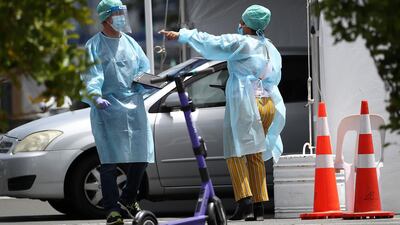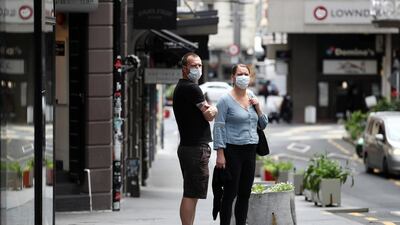A pre-symptomatic passenger on a Dubai to New Zealand flight infected at least four others with the coronavirus, despite being tested 48 hours before departure.
The case was revealed by the authorities in Auckland after the infections emerged during a 14-day stay in isolation.
Seven of the 86 passengers on board tested positive during mandatory quarantine following the flight on September 29.
They originated from five different countries and boarded the aircraft in Dubai, which was bound for New Zealand’s largest city.
All sat within four rows of each other on the flight.
"By combining information on disease progression, travel dynamics and genomic analysis, we conclude that at least four in-flight transmission events of Sars-CoV-2 likely took place," researchers wrote.
“Four of these six related genome sequences were from Switzerland, the country of origin of the suspected index case.”
Experts said the case underscores the risks of flying during the pandemic, despite precautions designed to protect passengers, including pre-flight testing and mandatory masks.
People typically develop symptoms of Covid-19 five to six days after contracting the virus, but they can spread it to others two to three days before getting sick themselves.
The study authors said the flight’s original case likely became infectious after he took the pre-flight test, but did not become symptomatic until 71 hours, almost three full days, after the flight.
Transmission occurred despite the use of masks in-flight, they said.
Airlines do, however, permit passengers to remove masks during meals and drinks, which continue to be served on board flights during the pandemic.
David Freedman, an infectious-disease specialist at the University of Alabama told The Washington Post, which first reported the study this weekend, the length of the flight may also have played a factor.
“It would have been really hard for people to keep their masks on for the entire 18 hours,” he said.
The study was made possible due to New Zealand’s strict procedures for returning travellers, who are required to stay in quarantine facilities for 14 days post-arrival.
The policy has been in place since March.
The seven cases detected as a result of the flight were among 215 diagnosed out of a total of 62,698 arrivals into New Zealand as of October 20.
The results of the study call into question the findings of recent research which concluded flying posed a “low risk” during the pandemic.
The US Department of Defence research, released last month, said someone who was contagious would have to be in close contact with a fellow passenger for 54 hours to infect them.
However, other studies have demonstrated the virus was able to spread efficiently on board flights, particularly in the early days of the pandemic, when masks were not required.
In one study, researchers at the National Institute of Hygiene and Epidemiology in Hai Ba Trung District, Hanoi, Vietnam, concluded one symptomatic passenger in business class transmitted the virus to at least 15 other passengers during a flight from London to Hanoi in March.
Of those, 12 were sitting close by in business class, but two other passengers and one flight attendant who contacted it were in economy class.
Masks are now mandatory on flights across the globe, and many countries also require passengers to provide negative test certificates as a prerequisite for entry.


















